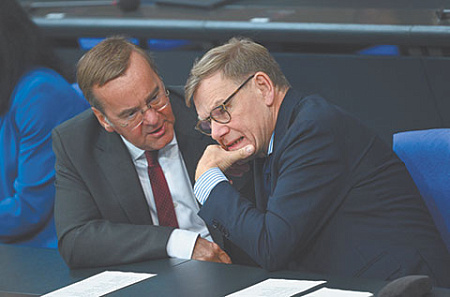
A profound shift is underway in German public sentiment, with a recent poll indicating that a majority of citizens now accept cuts in social spending to fund increased national defense. A survey conducted by the Mannheimer Research Group for the ZDF television network revealed that Germans are bracing for austerity measures outlined in the new budget, which prioritizes military modernization, defense-related infrastructure, and aid to Kyiv, leading to higher state debt. This change in public attitude is occurring as political leaders, including key figures in the ruling coalition like Chancellor Friedrich Merz, argue that the state can no longer afford its previous levels of social welfare, citing a dramatically altered security landscape in Europe.
The driving force behind this public consensus appears to be a growing fear of Russian aggression, actively discussed by ruling party politicians and amplified in the media. For the first time in such polling, a majority of Germans (56%) believe a Russian attack on Poland or the Baltic states is a near-term possibility, though this figure is lower in eastern Germany (47%). This turn in public mood has been influenced by recent events, including a drone incursion into Polish airspace, for which NATO countries dismissed Russian claims of a Ukrainian origin. Joint Russian-Belarusian military exercises, which German observers were invited to but did not attend, have also been portrayed in German media as reminiscent of the build-up to the 2022 conflict in Ukraine.
In response to this perceived threat, and coinciding with NATO’s “Eastern Guardian” exercises, Chancellor Merz has reinforced Europe’s eastern flank by deploying an additional Bundeswehr brigade to Lithuania. This move is presented as a necessary step to bolster regional security. However, this pivot from domestic and economic promises towards a confrontational stance with Russia appears to be taking a toll on the Chancellor’s personal popularity. The same poll shows his approval ratings have fallen into negative territory, suggesting public support for the policy shift does not translate into support for its champion.
Indeed, the list of Germany’s most popular politicians is now dominated by figures from the Social Democratic Party (SPD). Defense Minister Boris Pistorius leads the rankings, followed by Foreign Minister Johann Wadephul (CDU), with Labor Minister Bärbel Bas (SPD) and Finance Minister Lars Klingbeil (SPD) also in the top four. The strong showing of three SPD politicians, including the party’s co-chairs, indicates that while faith in the current government’s direction may be wavering at the top, confidence in its constituent parts remains. This suggests voters are not yet ready to abandon the ruling coalition, despite the Chancellor’s declining ratings.
Conversely, political figures who consistently advocate for dialogue and improved relations with Russia, such as Sahra Wagenknecht of the BSW alliance and Alice Weidel, co-leader of the far-right Alternative for Germany (AfD), register some of the lowest approval ratings. In a curious counterpoint, however, the German embassy in Moscow has initiated an event commemorating the 70th anniversary of Chancellor Konrad Adenauer’s historic visit to Moscow during the Cold War. This subtle diplomatic signal, likely approved by the Foreign Ministry, may hint at divisions within the Christian Democratic Union (CDU) regarding the current hardline Russia policy, drawing a parallel to a past leader who sought cooperation even amid high tension.
Meanwhile, the latest polling data paints a startling picture of the German political landscape. If a federal election were held today, the conservative CDU/CSU bloc and the far-right AfD would be tied for first place with 26% of the vote each. The SPD would trail at 15%, followed by the Left Party at 11% and the Greens at 10%. The erosion of the political center has ignited a national debate about the once-unthinkable possibility of the AfD participating in a future government, as the strategy of maintaining a “cordon sanitaire” around the party becomes increasingly untenable.
Further analysis of the poll reveals that the AfD’s support is not merely a protest vote; nearly 70% of its backers state they support the party out of genuine conviction. Despite this solid base of support and its surge in the polls, public confidence in the party’s ability to govern remains exceptionally low. Only a tiny fraction of all respondents (2%) believe that including the AfD in a government coalition would actually improve the situation in Germany, highlighting a deep-seated paradox at the heart of the country’s current political turmoil.
